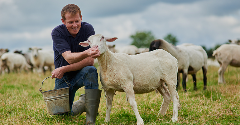News
Could the EU-Mercosur trade deal be revived?
14 Dec 2022The re-election of Luiz Inácio da Silva, or Lula, as president of Brazil has prompted speculation that the free-trade agreement between the EU and South American Mercosur bloc could be revived – but the European farming sector has concerns.
Lula’s third-round presidency victory has raised immediate questions on whether this will unlock the currently stalled trade agreement with the South American Mercosur bloc. The Mercosur bloc comprises Brazil, Argentina, Paraguay and Uruguay as its founding members.

The European Union (EU) has set its sights on the Latin American market for trade deals. With the EU looking to diversify its trade flow routes away from Russia primarily but also China, a trade deal with Latin America is a big ambition. Although the Mercosur deal, which would secure trade opportunities between the EU and South America, was signed in 2019, it has yet to be ratified and has effectively remained a non-starter.
Interest turns to whether revised policies on deforestation, climate change and trade will now be in better alignment with the EU and, therefore, may signify the time to resurrect once seemingly buried conversations on initiating the Mercosur deal.
“With the election of Lula in Brazil, the atmosphere around climate/sustainability and especially zero deforestation commitments are certainly changing, which will most likely increase the willingness in Europe to proceed with the Mercosur trade deal,” Ksenija Simovic, senior policy advisor at Copa-Cogeca, the association representing EU farmers and agri-cooperatives, told Ingredients Network.
Reviving Mercosur: Many problems still not resolved
Copa Cogeca states that, due to the war in Ukraine, there is the shared goal of applying urgency to the EU’s search for new trade opportunities and existing agreements. However, it says that a move to ratify the EU-Mercosur deal could lead to the Commission compromising Europe’s farming sustainability further.
The association highlights that the European Commission will claim that the directive on deforestation affecting imported products, passed by the European Parliament in September 2022, does enhance the agreement’s control and sustainability. However, “it would be far from resolving the many problematic points of this agreement when it comes to agriculture,” Christiane Lambert, president of Copa says.
EU fights back: Calls for equality and fairness
In the opinion piece, Lambert relays that core issues exist relating to the Mercosur agreement in the context of the agricultural landscape. Firstly, Lambert states the Mercosur deal is unbalanced in favour of large operators in South America as it removes the negotiating opportunities from European farmers, particularly in fragile agricultural sectors, such as beef, poultry, rice, orange juice, sugar and ethanol.
Secondly, European farmers are concerned about the cumulative and difficult-to-quantify effects of all agreements signed by the EU. A lack of sustainability in the long term is a worry. In poultry, for example, annual imports from Mercosur will equal the combined production total of Denmark, Finland, and Sweden.
Thirdly, Copa reports a double standard is being placed on EU farmers, setting out forbidden goods in the EU and those tolerated within imports. Highlighting sugar beet as an example, European imports of sugar and ethanol do not reflect their production standards. For example, the association states that Brazil uses 27 herbicides and insecticides that are currently banned in Europe.
 © AdobeStock/Budimir Jevtic
© AdobeStock/Budimir Jevtic
Additionally, it states the implementation of the Green Deal will add a wider gap in standards between the EU and Mercosur farmers. Its introduction makes an already untenable agreement worse for European producers, it relays, as it was designed before the release of Farm-to-Fork and the war in Ukraine.
“It would therefore be both anachronistic and detrimental; thus, we firmly denounce it,” states Lambert in the opinion piece.
Overcoming sector-specific sensitivities
Production standards will need, therefore, to be examined and resolved from a solutions-driven perspective to ensure no market is at a competitive disadvantage.
“Copa Cogeca cannot support this deal as it stands now due to concerns on certain standards of production and due to the heavy impact it would have on some of the sensitive sectors,” adds Simovic.
“Any attempt by the Commission to force the passage of this agreement would be truly scandalous and set a dangerous precedent for EU farming,” adds Lambert.
Related news

California companies required to disclose heavy metal content in baby food
10 Jan 2025
As of January 2025, baby food manufacturers selling in California must disclose test results for four heavy metals – arsenic, lead, cadmium, and mercury – via an on-pack QR code.
Read more
Snack trends, ingredient claims, and plant-based perceptions: Highlights from Fi Europe 2023, part 1
7 Dec 2023
Value-led snacking, sustainability storytelling, and the importance of having a ‘star ingredient’: we asked consumer analysts and market experts at Fi Europe about the trends and innovations that are shaping the food industry.
Read more
Confirmed: California bans four ‘toxic’ food additives
10 Oct 2023
Four food additives, including the colouring Red No. 3, will be banned in food in the US state of California over safety concerns, with public health campaigners hoping this will spark a nationwide ban in the coming years.
Read more
Advocacy groups condemn EU Commission for backpedalling on animal rights
3 Oct 2023
Amid rumours that the EU may abandon its plans to improve animal welfare in farming and end the use of cages, many stakeholders have condemned this possibility and urged the EU to reconsider.
Read more
Poland and Ukraine attempt to resolve grain dispute
29 Sep 2023
Poland and Ukraine have begun talks to try to resolve a dispute regarding the ban on Kyiv’s grain imports that prompted Kyiv to file a lawsuit to the World Trade Organization.
Read more
The EU may be set to scrap its sustainability commitments
27 Sep 2023
A speech delivered by President Ursula von der Leyen last week inferred that the EU could be drawing back on its commitments to create a more sustainable and healthier food system.
Read more
Industry first: Mosa Meat becomes first cultivated meat startup to gain B Corp certification
11 Sep 2023
A first for the industry, Dutch cultivated meat company Mosa Meat announced that it has received B Corp certification and will soon apply for regulatory approval across the globe.
Read more
German supermarket trials climate-centric pricing model
29 Aug 2023
German discount supermarket Penny has trialled increasing product prices to mirror their health and environmental costs.
Read more
EPR fee delay spurs concerns over UK’s sustainability commitment
8 Aug 2023
The UK government’s decision to push back the introduction of fees for the Extended Producer Responsibility (EPR) due to inflation has raised doubts about whether this sustainability commitment will ever be realised.
Read more
Latino-owned food startups tackle climate change
25 Jul 2023
A growing list of Latino-founded food and beverage startups in the US are putting sustainability at the forefront of their businesses for the sake of the planet.
Read more